Did effective mortgage interest rates stop rising six months ago?
There is a pretty good argument that effective interest rates stopped rising six months ago. At the same time that house prices stopped falling.
The simplest measure of interest rates for Australian housing is the cash rate set by the Reserve Bank of Australia. But it is far from the best.
While there is a “standard variable rate”, banks so routinely discount that there is also a “discounted standard variable” rate. However, if you used only those interest rates, you would have missed that banks were subsidised on three-year fixed mortgages during the pandemic. The standard variable rate was over 5%, while three-year fixed mortgages were closer to 2%.
We run an interactive property valuation model, and a key input is the interest rate. I’m arguing that house prices are set by transactions. And transactions usually involve a new home loan. When customers take out a new home loan, the most frequent choice in Australia is between a three-year fixed mortgage rate or a variable rate. So, the interest rate we use in our interactive valuation model is the minimum of the discounted standard variable rate and the discounted three-year mortgage rate.
When you look at interest rates that way, what is interesting is that the effective interest rate hasn’t risen for almost six months now:
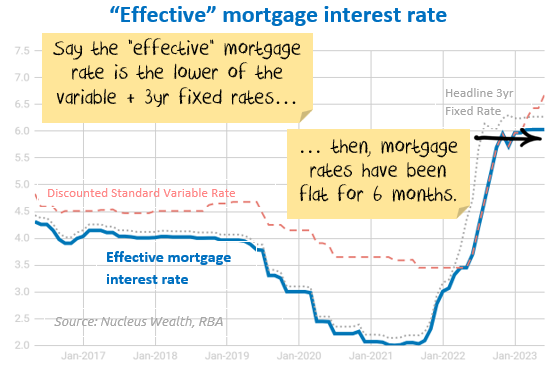
This corresponds with the bottom in housing prices.
The poor are getting poorer.
Another factor is the level of discounting by banks. It is now more than double the typical discount:
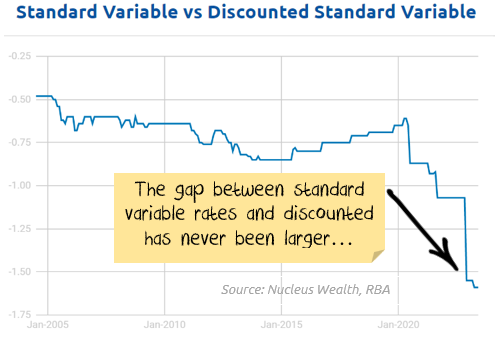
And that only tells part of the story. Jump on to any home loan comparison site. Plenty of home loans are available at rates lower than the RBA’s discounted standard variable rate. Discounts well over 2% and even as much as 3% are common.
The “standard” variable rate is looking more and more like the sticker price on a used car. i.e. a rate that very few people actually pay.
This is important. What it means is a bifurcated market:
- Households who could afford to pay higher interest rates don’t have to. They can borrow at 2% lower than the standard variable rate.
- Struggling households have to pay much higher interest rates than those in the above category.
It is the second group that I am most interested in. Many will default or sell their houses. If that number is small, the housing market will absorb the extra volume with little effect on prices. If the number is large, house prices will have much further to fall.
Affordability
Australian property market prices have stabilised, and rents are rising rapidly. Affordability statistics have slightly improved in recent months, but only from record poor levels to slightly better than record poor.
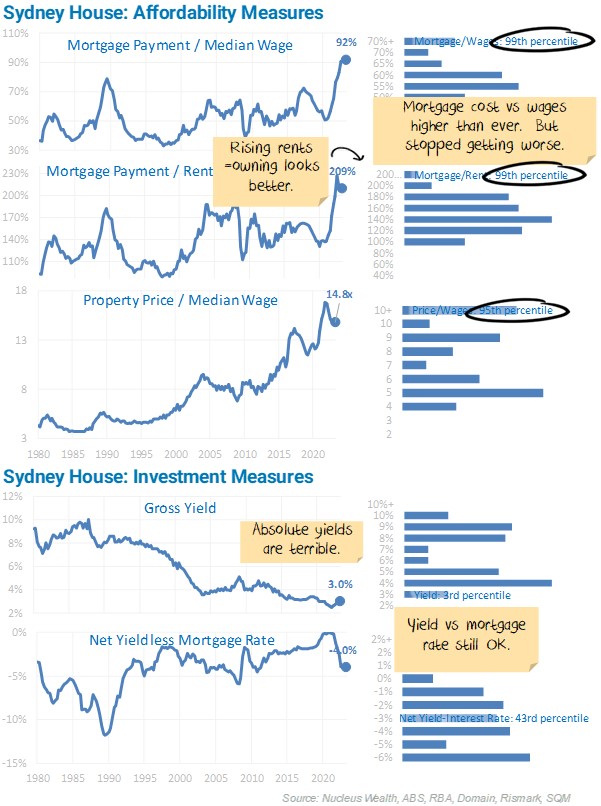
See property detail update for other cities.
The affordability of units is below average, but nowhere near as bad as houses. This is likely reflecting:
- a change in living preferences following the pandemic
- the effect of lower population growth (particularly students) over the last few years
For investors, rental yields are improving due to the boom in rents.
What are the limits to house prices?
Valuing the overall housing market is difficult given the rise in Australian house prices over the last 30 years. But there are limits. If house prices grow at 10% p.a. for the next 20 years, and wages/rents kept going up at their historical rates then:
- The median Sydney house price would be over $7m
- The median Sydney house price would be 45x higher than the median wage.
- Even if you managed to scrape together the 5% deposit (only twice the median annual pretax salary) to qualify for a 95% mortgage, the mortgage payment would come in at almost 3x the median pretax salary
That is not a realistic vision. So, we created an Australian property market calculator to help investors or potential homeowners determine the returns on Australian property. The idea we want to illustrate is that there are a number of key inputs into housing valuation. Interest rates are the most important, but the other limiting factors are:
- Mortgage Payments to Rent: comparing the cost of a mortgage with the cost of renting the same house. Using this ratio to constrain house prices, we assume that people will prefer to rent when the ratio gets high rather than buy.
- Mortgage Payments to Wages: assuming when the ratio gets high, people rent because they cannot afford to buy.
- Property Prices to Wages: assuming when the ratio gets high, people rent because they cannot save enough money to afford a deposit. We treat this as less important than the above two ratios.
- Rental Yield: Rental yield is the annual rent divided by the property price. By using this ratio to forecast prices, you are assuming when the ratio gets low investors will not buy property as they are not getting a return that is high enough.
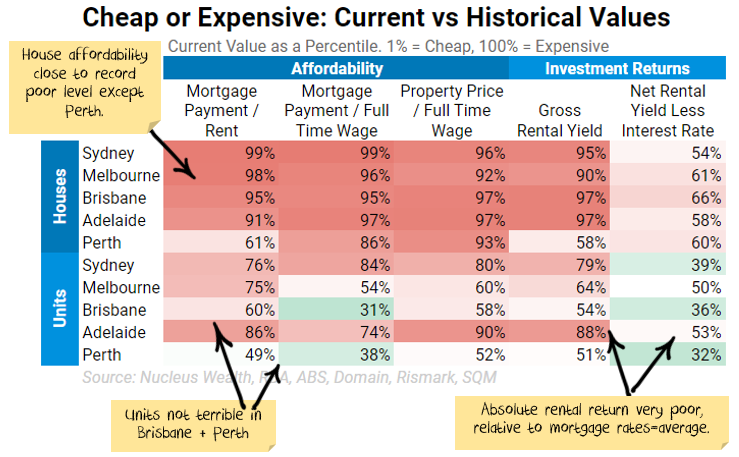
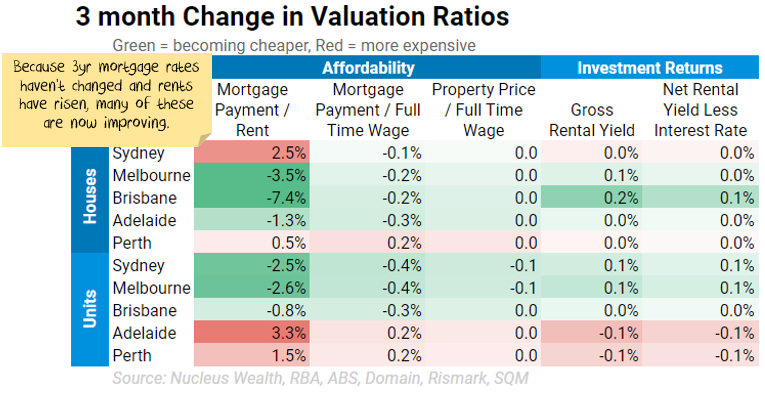
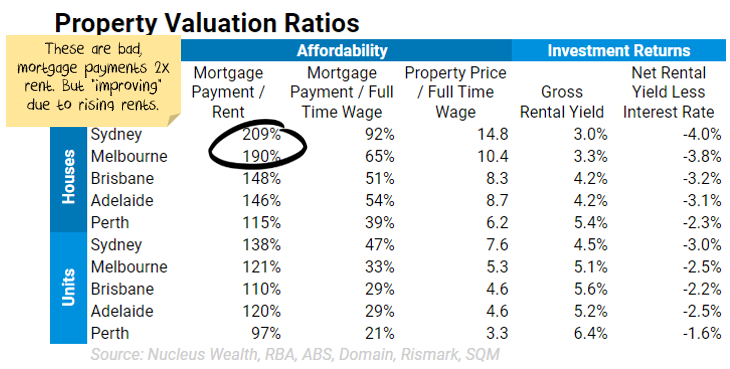
Detailed charts for the above locations can be found in the property detail update. For more on how and why we use these ratios, see our residential real estate forecasting methodology.
Macro factors
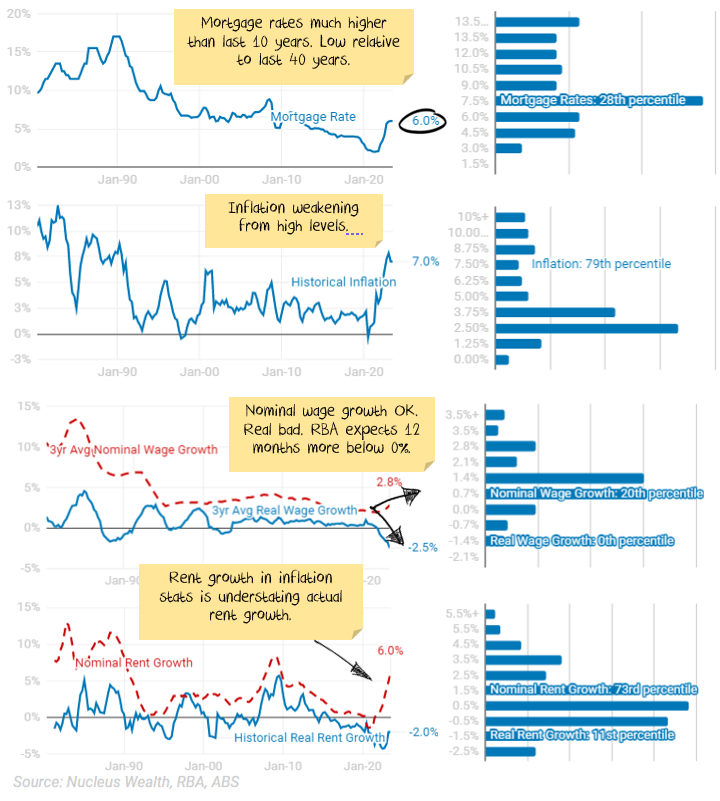
Australian Property Market Outlook
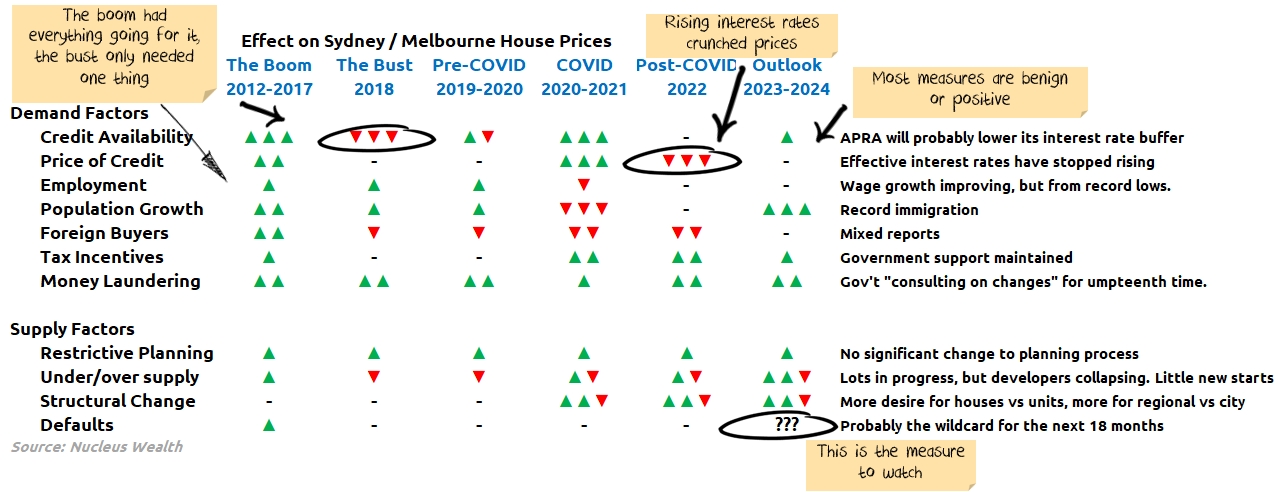
There are a lot of opposing forces:
- Property prices stopped falling when the effective interest rate stopped rising. But, there is a mortgage cliff in progress where mortgage holders with three-year mortgages set during the pandemic are being reset to interest rates 3x higher.
- Property developers are falling over left and right, caught between rising costs and fixed-price contracts. A lot of houses are currently being constructed, but only a few new ones are starting. With record immigration, supply looks like it will be tight for some time.
- Rents are increasing rapidly. But wage growth is low.
- Australia starts with a larger private debt burden than just about any other country. But there is a burning political desire to keep Australian property market prices high and pump more debt into the economy.
- The Australian economy has handled higher interest rates well to date. But higher interest rates take time to take effect. And a credit crunch is brewing internationally. If the Reserve Bank is wrong, they won’t realise it before a recession arrives.
Behind door A, there is mild global recession, limited housing defaults and property prices have bottomed. Any cuts in interest rates could spur house prices a little higher, but affordability measures are already very stretched.
Behind door B, a global recession, considerable housing defaults and property prices see another leg down.
Sources:
Nucleus Wealth has compiled this data using a range of different sources.
We use Domain for more recent data quarterly property prices and rents, cross-checked with SQM to fill any short-term moves. Older information is from Rismark and the Australian Bureau of Statistics to fill time series.
For economic data, we use either Reserve Bank of Australia or Australia Bureau of Statistics data. For older data, we have had to estimate some factors due to differing definitions over time.

